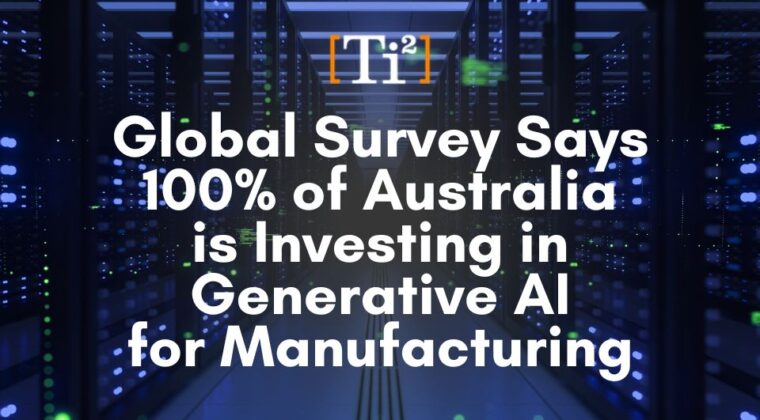
An interesting global survey by Lucidwork, shows that that 100% of Chinese and Australian manufacturing survey participants said they plan to increase investment in Generative AI, compared to only 92% of United States participants. The study apparently includes respondents from nearly 400 manufacturing and B2B companies worldwide. This blog revolve around what aspects would be the first steps of AI investments for most companies and the pro and contra of each aspect for initial AI investment.
The 10 aspects concluded includes:
1. Predictive Maintenance
2. Quality Control and Inspection
3. Process Optimisation
4. Supply Chain Management
5. Customisation and Personalisation
6. Natural Language Processing (NLP)
7. Generative AI and Design Optimisation
8. Safety and Compliance
9. Employee Training and Augmentation
10. Cybersecurity and Data Protection
1. Predictive Maintenance
Pros:
- Reduced Downtime: Predictive maintenance can foresee potential failures, enabling timely repairs and reducing costly production halts.
- Cost Savings: By preventing major breakdowns, companies save on expensive repairs and replacements.
- Increased Equipment Lifespan: Regular, proactive maintenance extends the lifespan of machinery.
Cons:
- Implementation Costs: Initial setup and integration can be expensive.
- Data Dependency: Reliable predictive maintenance requires a substantial amount of historical data.
2. Quality Control and Inspection
Pros:
- Enhanced Product Quality: AI-powered inspection systems can detect defects at a microscopic level, ensuring high-quality products.
- Higher Throughput: Automated inspections can be performed at high speeds, improving overall production efficiency.
Cons:
- Upfront Investment
- Complexity of Implementation: Fine-tuning algorithms and ensuring accuracy can be time-consuming.
3. Process Optimisation
Pros:
- Efficiency Gains: AI-driven optimisation can streamline production processes, leading to resource and time savings.
- Adaptability: AI systems continuously learn and adapt to changing conditions, ensuring ongoing efficiency improvements.
Cons:
- Data Sensitivity: Relying heavily on data means that any inaccuracies or biases in the data can lead to suboptimal results.
- Resistance to Change: Some employees may be resistant to adopting AI-driven changes in established processes.
4. Supply Chain Management
Pros:
- Improved Demand Forecasting: AI can analyse market trends and historical data for more accurate demand predictions.
- Reduced Overheads: Optimisation of supply chains can lead to reduced inventory costs and more efficient logistics.
Cons:
- Integration Challenges: Integrating AI into existing supply chain systems may require substantial effort and resources.
- Dependency on Accurate Data: Inaccurate or outdated data can lead to incorrect forecasts and planning.
5. Customisation and Personalisation
Pros:
- Enhanced Customer Satisfaction: Tailoring products to individual preferences leads to higher customer satisfaction and brand loyalty.
- Market Segmentation: AI helps identify and target specific market segments more effectively.
Cons:
- Complexity in Scaling: Customisation may be more challenging to implement at large scales, particularly in mass production environments.
- Balancing Costs: Achieving customisation while maintaining cost-effectiveness can be a delicate balance.
6. Natural Language Processing (NLP)
Pros:
- Improved Communication: NLP enables automated responses, efficient customer support, and real-time language translation.
- Market Insights: Sentiment analysis provides valuable insights into customer feedback and preferences.
Cons:
- Language Sensitivity: NLP systems may struggle with certain languages, dialects, or colloquialisms.
- Ethical Considerations: Handling sensitive customer data requires robust privacy and security measures.
7. Generative AI and Design Optimisation
Pros:
- Innovative Product Development: Generative AI can generate novel designs and optimise existing ones, fostering innovation.
- Efficiency in Prototyping: Rapid prototyping and design iteration can lead to faster time-to-market.
Cons:
- Balancing Creativity with Practicality: Generated designs may require human input to ensure they align with production capabilities and market demands.
- Resource Intensive: Training Generative AI models can be computationally intensive and time-consuming.
8. Safety and Compliance
Pros:
- Risk Reduction: AI systems can monitor operations for compliance with safety regulations, reducing the risk of accidents and legal penalties.
- Real-time Alerts: Immediate notifications of potential safety breaches allow for swift corrective action.
Cons:
- False Positives/Negatives: Overly sensitive systems may generate false alarms, leading to unnecessary interruptions.
- Ethical Implications: Balancing safety with privacy and individual rights requires careful consideration.
9. Employee Training and Augmentation
Pros:
- Skill Development: AI-driven simulations and virtual assistants can enhance employee skills and knowledge.
- Reduced Workload: Automation of routine tasks allows employees to focus on higher-value, strategic activities.
Cons:
- Adaptation Challenges: Some employees may face a learning curve when adapting to new AI-driven tools and technologies.
- Potential Job Displacement: Depending on the extent of automation, there may be concerns about job security.
10. Cybersecurity and Data Protection
Pros:
- Advanced Threat Detection: AI-powered cybersecurity systems can identify and respond to threats in real-time.
- Data Privacy: Protecting sensitive data becomes more robust with AI-driven encryption and access controls.
Cons:
- Adversarial Attacks: AI systems can be vulnerable to sophisticated attacks that exploit their learning algorithms.
- Ongoing Maintenance: Cybersecurity measures require continuous updates and monitoring to stay effective.
In conclusion, investing in AI for manufacturing offers a multitude of benefits, but it’s not without its challenges. Companies must carefully consider their specific needs, resources, and capabilities before embarking on an AI integration journey. Additionally, ethical and regulatory considerations should be at the forefront of any AI implementation. By strategically harnessing the power of AI, manufacturing companies can position themselves for long-term success and innovation in an increasingly competitive global market.
Contact us HERE if you’re interested in implementing generative AI in your industrial projects to unlock its benefits and drive innovation in your industry.
Or to learn more about what we can do to help your automation requirements, please click projects, products & services.
Ti2 is currently very focused on working with its global partners to secure stock and avoid long delay times in delivering products to their customers. Together with our trusted partners, we are here to provide solutions for your needs.
Please click here to email us your inquiry, we would like to hear from you.
